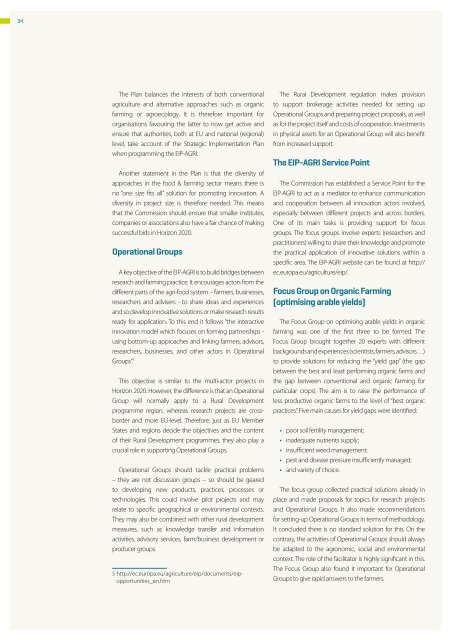tpo_dossier_action-plan-for-innovation-and-learning_201406
tpo_dossier_action-plan-for-innovation-and-learning_201406
tpo_dossier_action-plan-for-innovation-and-learning_201406
Create successful ePaper yourself
Turn your PDF publications into a flip-book with our unique Google optimized e-Paper software.
34The Plan balances the interests of both conventionalagriculture <strong>and</strong> alternative approaches such as organicfarming or agroecology. It is there<strong>for</strong>e important <strong>for</strong>organisations favouring the latter to now get active <strong>and</strong>ensure that authorities, both at EU <strong>and</strong> national (regional)level, take account of the Strategic Implementation Planwhen programming the EIP-AGRI.Another statement in the Plan is that the diversity ofapproaches in the food & farming sector means there isno “one size fits all” solution <strong>for</strong> promoting <strong>innovation</strong>. Adiversity in project size is there<strong>for</strong>e needed. This meansthat the Commission should ensure that smaller institutes,companies or associations also have a fair chance of makingsuccessful bids in Horizon 2020.Operational GroupsA key objective of the EIP-AGRI is to build bridges betweenresearch <strong>and</strong> farming practice. It encourages actors from thedifferent parts of the agri-food system – farmers, businesses,researchers <strong>and</strong> advisers - to share ideas <strong>and</strong> experiences<strong>and</strong> so develop innovative solutions or make research resultsready <strong>for</strong> application. To this end it follows “the interactive<strong>innovation</strong> model which focuses on <strong>for</strong>ming partnerships -using bottom-up approaches <strong>and</strong> linking farmers, advisors,researchers, businesses, <strong>and</strong> other actors in OperationalGroups”. 5This objective is similar to the multi-actor projects inHorizon 2020. However, the difference is that an OperationalGroup will normally apply to a Rural Developmentprogramme region, whereas research projects are crossborder<strong>and</strong> more EU-level. There<strong>for</strong>e, just as EU MemberStates <strong>and</strong> regions decide the objectives <strong>and</strong> the contentof their Rural Development programmes, they also play acrucial role in supporting Operational Groups.Operational Groups should tackle practical problems– they are not discussion groups – so should be gearedto developing new products, practices, processes ortechnologies. This could involve pilot projects <strong>and</strong> mayrelate to specific geographical or environmental contexts.They may also be combined with other rural developmentmeasures, such as knowledge transfer <strong>and</strong> in<strong>for</strong>mationactivities, advisory services, farm/business development orproducer groups.5 http://ec.europa.eu/agriculture/eip/documents/eipopportunities_en.htmThe Rural Development regulation makes provisionto support brokerage activities needed <strong>for</strong> setting upOperational Groups <strong>and</strong> preparing project proposals, as wellas <strong>for</strong> the project itself <strong>and</strong> costs of cooperation. Investmentsin physical assets <strong>for</strong> an Operational Group will also benefitfrom increased support.The EIP-AGRI Service PointThe Commission has established a Service Point <strong>for</strong> theEIP-AGRI to act as a mediator to enhance communication<strong>and</strong> cooperation between all <strong>innovation</strong> actors involved,especially between different projects <strong>and</strong> across borders.One of its main tasks is providing support <strong>for</strong> focusgroups. The focus groups involve experts (researchers <strong>and</strong>practitioners) willing to share their knowledge <strong>and</strong> promotethe practical application of innovative solutions within aspecific area. The EIP-AGRI website can be found at http://ec.europa.eu/agriculture/eip/.Focus Group on Organic Farming(optimising arable yields)The Focus Group on optimising arable yields in organicfarming was one of the first three to be <strong>for</strong>med. TheFocus Group brought together 20 experts with differentbackgrounds <strong>and</strong> experiences (scientists, farmers, advisors…)to provide solutions <strong>for</strong> reducing the “yield gap” (the gapbetween the best <strong>and</strong> least per<strong>for</strong>ming organic farms <strong>and</strong>the gap between conventional <strong>and</strong> organic farming <strong>for</strong>particular crops). The aim is to raise the per<strong>for</strong>mance ofless productive organic farms to the level of “best organicpractices”. Five main causes <strong>for</strong> yield gaps were identified:• poor soil fertility management;• inadequate nutrients supply;• insufficient weed management;• pest <strong>and</strong> disease pressure insufficiently managed;• <strong>and</strong> variety of choice.The focus group collected practical solutions already inplace <strong>and</strong> made proposals <strong>for</strong> topics <strong>for</strong> research projects<strong>and</strong> Operational Groups. It also made recommendations<strong>for</strong> setting-up Operational Groups in terms of methodology.It concluded there is no st<strong>and</strong>ard solution <strong>for</strong> this. On thecontrary, the activities of Operational Groups should alwaysbe adapted to the agronomic, social <strong>and</strong> environmentalcontext. The role of the facilitator is highly significant in this.The Focus Group also found it important <strong>for</strong> OperationalGroups to give rapid answers to the farmers.


